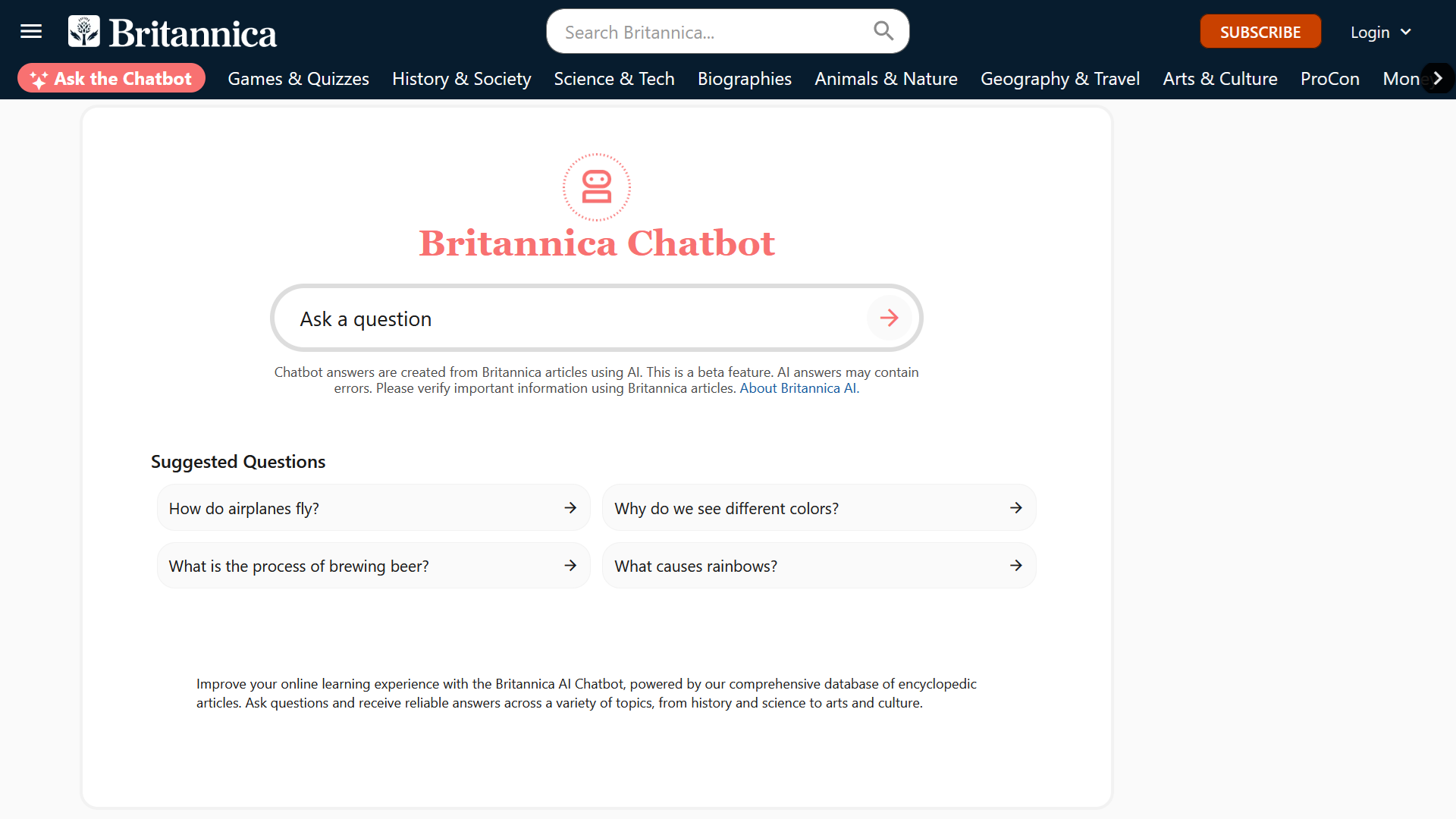Developer Offer
Try ImaginePro API with 50 Free Credits
Build and ship AI-powered visuals with Midjourney, Flux, and more — free credits refresh every month.
Britannica AI Versus ChatGPT A Factual Face Off
 Image credit: Britannica
Image credit: Britannica
Considering a full Encyclopedia Britannica set in 2025 might seem like a nod to a bygone era, perhaps something for a dedicated traditionalist. However, after experimenting with the Britannica AI chatbot, the idea becomes surprisingly appealing. While shelf space for 32 massive volumes might be scarce, this AI acts as an incredibly helpful reference librarian, drawing upon over 250 years of fact-checked information to address inquiries.
A key advantage is its restricted sourcing, which significantly reduces concerns about the AI generating inaccuracies or fantastical responses. While the cross-referenced answers may not match the sheer breadth of information available to general-purpose AI chatbots like ChatGPT, this limitation isn't always a disadvantage.
Interestingly, if Britannica AI encounters a question it feels ill-equipped to answer directly, it will leverage ChatGPT for a response, but not without an important caveat: an explicit warning that such AI-generated answers could be flawed. With this in mind, I decided to put ChatGPT to the test with the types of questions one would typically pose to an encyclopedia's AI.
Round 1: Unraveling French History
 Image credit: Apple TV+
Image credit: Apple TV+
Historical inquiries are a cornerstone of encyclopedia usage. Early encyclopedists aimed to distill vast geopolitical complexities into accessible articles. I prompted both AI chatbots: “Explain the causes and consequences of the French Revolution.”
Britannica AI delivered its response in dense bullet-point lists, outlining the revolution's catalysts and subsequent results. It connected factors like social inequality under the Ancien Régime and the Enlightenment to the Napoleonic Wars. Furthermore, it suggested several related follow-up questions and provided links to 13 cited Britannica articles. Each article offers profound depth, but for the quick, comprehensive answers needed for such a complex topic, Britannica's response was ideal.
ChatGPT opted for a more narrative style with a noticeably more conversational and casual tone. Its answer contained no glaring errors but, a recurring theme in this comparison, it lacked the authoritative weight of Britannica's chatbot.
Round 2: Deconstructing Shakespeare's Macbeth
 Image credit: Apple TV Plus
Image credit: Apple TV Plus
Literature presents a more nuanced challenge for encyclopedias, demanding authoritative opinions for explanation and analysis. Optimal articles blend factual information with well-reasoned interpretations of an author's work. Shakespeare is a figure Britannica has extensively covered since its inception. Thus, my next prompt for both AI tools was: “Summarize the plot and themes of Shakespeare’s Macbeth.”
Britannica AI returned with a well-condensed summary of the play, followed by a list of five major themes, each with a concise explanation of its relevance to Macbeth. ChatGPT's summary was again more casually phrased. Intriguingly, it appeared that ChatGPT was either using Britannica as a source or drawing from a secondary source that itself referenced Britannica, as its list of themes and their application to the play was almost identical.
For example, Britannica described one theme as: "The Supernatural: The Weird Sisters represent the supernatural, catalyzing Macbeth's corruption and blurring the line between reality and illusion. Their prophecies influence Macbeth's actions, but are ultimately deceptive."
Meanwhile, ChatGPT's response essentially rephrased and condensed this point: "The Supernatural: Witches, visions, and omens create a foreboding atmosphere and symbolize the moral disorder brought about by Macbeth’s actions."
Round 3: The Cellular Divide - Mitosis vs Meiosis
 Image credit: Catalog
Image credit: Catalog
Transitioning from Shakespeare to cellular biology, my next query focused on science. I asked both AI chatbots: “What are the main differences between mitosis and meiosis?”
Britannica AI was clearly in its element here. It provided a side-by-side comparison of the two processes, distinctly outlining the number of cell divisions, the genetic outcomes, and the biological roles of each. ChatGPT, perhaps feeling it had little to add, delivered its shortest response yet. To illustrate, Britannica AI answered with another bulleted list of differences after stating: "Mitosis and meiosis are both forms of cell division in eukaryotic cells, but they have distinct outcomes. Mitosis produces two genetically identical daughter cells from a single parent cell and is used for growth, repair, and asexual reproduction. Meiosis, on the other hand, is a specialized type of cell division that occurs in sexually reproducing organisms. It gives rise to four genetically distinct gametes (sex cells) with half the number of chromosomes as the original cell."
ChatGPT's answer, while correct, was somewhat less detailed—some might argue less encyclopedic: "Mitosis produces two genetically identical daughter cells with the same number of chromosomes as the parent cell, used for growth, repair, and asexual reproduction. Meiosis, on the other hand, results in four genetically unique daughter cells with half the number of chromosomes, essential for sexual reproduction."
The Verdict: When to Trust Which AI
Britannica AI proves to be as impressive and reliable as its namesake encyclopedia. I particularly appreciated the concise capsule summaries it provided, which is how I’d typically use an encyclopedia when short on time. The densely informative articles it linked to were reminiscent of those I would read for enjoyment as a child when I had more leisure.
ChatGPT performed best when its answers closely mirrored those of Britannica. While its far more casual response language is generally acceptable, it doesn't quite capture the academic appeal of Britannica's output. Furthermore, with ChatGPT, there's an ever-present need for caution regarding potential inaccuracies ("hallucinations") and the necessity to double-check any fact that seems questionable or overly simplified.
When I require a trustworthy factual answer or seek rock-solid citations, Britannica AI is poised to become my new preferred AI chatbot. For inquiries or tasks that extend beyond the scope of an encyclopedia, I will continue to turn to ChatGPT as my AI assistant. Nevertheless, I know which one I’d rather have adorning my bookshelf as a handsome set of leather-bound volumes.
Dive Deeper: Further Reading
- Did ChatGPT ruin the em dash? Here’s how to stop it from putting them everywhere
- 5 ChatGPT prompts to inspire your creativity
- I replaced my to-do list with ChatGPT’s Tasks feature and it completely changed the way I plan my life
About the Author
Eric Hal Schwartz is a freelance writer for TechRadar with more than 15 years of experience covering the intersection of the world and technology. For the last five years, he served as head writer for Voicebot.ai and was on the leading edge of reporting on generative AI and large language models. He's since become an expert on the products of generative AI models, such as OpenAI’s ChatGPT, Anthropic’s Claude, Google Gemini, and every other synthetic media tool. His experience runs the gamut of media, including print, digital, broadcast, and live events. Now, he's continuing to tell the stories people want and need to hear about the rapidly evolving AI space and its impact on their lives. Eric is based in New York City.
Compare Plans & Pricing
Find the plan that matches your workload and unlock full access to ImaginePro.
| Plan | Price | Highlights |
|---|---|---|
| Standard | $8 / month |
|
| Premium | $20 / month |
|
Need custom terms? Talk to us to tailor credits, rate limits, or deployment options.
View All Pricing Details

